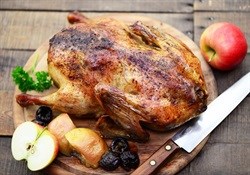
The Department of Agriculture‚ Forestry and Fisheries' amendments to proposed regulations allow for a slightly higher brine content in whole birds than was initially put forward - from 8% of the product's weight to 10%.
But the amended rules allow for 15% brining levels of individual poultry portions‚ well below the industry's request for 25%.
Adding brine‚ or a salt solution‚ to frozen poultry products is a common practice in the industry - with the purpose of tenderising‚ flavouring and preserving the meat.
But this also adds to the weight of the product‚ and standard "moisture contents" seem to be between 25%-30% of the mass of frozen poultry products‚ according to Vunani Securities analyst Anthony Clark.
Clark said poultry stocks heavily reliant on individually quick-frozen products and with high injectable rates of brine in their meat "will not be happy with this new regulation".
The stock that would be hardest hit was likely to be Astral Foods (ARL)‚ which derived the majority of its revenue from frozen products.
Clark said about R3.8bn of Astral's revenue in its most recent financial year would now be regulated "by a lower‚ more onerous‚ injectable rate".
"I understand that Rainbow (RCL) and Sovereign Foods (SOV) can cope and adjust to the new regulation. Astral‚ given its volumes and proportion of business derived may be a different matter‚" he said.
South African Poultry Association CEO Kevin Lovell said on Wednesday the association was still waiting for a mandate from its members "as to whether they are comfortable with the levels for portions‚ or whether they want us to challenge that".
Additionally‚ there were a number of technical flaws and loopholes in the regulations‚ about which the association and industry experts would meet to propose amendments‚ he said.
Lovell said the industry made low margins on individually quick frozen poultry portions‚ and the expected price increases as a result of the regulations would impact consumers.
Astral CEO Chris Schutte said the company believed the allowable brining level for individual portions under the amended regulations was "not appropriate and will not serve in the best interest of all stakeholders‚ particularly the consumers of brined chicken".
The regulations would have a detrimental impact on the price and affordability of individually quick frozen products‚ Schutte said‚ adding that Astral had also identified "technical flaws".
Astral said in a statement that while it supported that brining should be regulated‚ the amended regulations should be challenged by the poultry industry either through the South African Poultry Association or individual.

For more than two decades, I-Net Bridge has been one of South Africa’s preferred electronic providers of innovative solutions, data of the highest calibre, reliable platforms and excellent supporting systems. Our products include workstations, web applications and data feeds packaged with in-depth news and powerful analytical tools empowering clients to make meaningful decisions.
We pride ourselves on our wide variety of in-house skills, encompassing multiple platforms and applications. These skills enable us to not only function as a first class facility, but also design, implement and support all our client needs at a level that confirms I-Net Bridge a leader in its field.
Go to: http://www.inet.co.za